
Endometrial Microbiome and infertility

The endometrial microbiome consists of a set of
microorganisms (endometrial microbiota) that colonize
the lumen of the endometrium without damaging it, at
least under normal operating conditions of the immune
system.
Under
normal conditions, in healthy women at
reproductive age, the most common colonizing bacterial
species is Lactobacillus. Lactobacilli act as probiotics that
can inhibit the growth of bacteria, viruses and pathogenic
fungi, through a lowering of pH mediated by the
production of lactic acid. In these cases the endometrium
is defined Lactobacillus dominated (LD) and contains a
percentage of lactobacilli > 90%.
In
abnormal conditions, the percentage of lactobacilli
decreases (<90%) and the percentage of others bacteria
increases (> 10%). The endometrium is then defined non-
Lactobacillus-dominated (NLD).
Women with idiopathic infertility are often characterized
by an altered endometrial microbiota, with an increase
in colonization by anaerobic bacteria such as Atopobium,
Prevotella, Veillonella, Ureaplasma and Escherichia.
The most relevant example of pathology caused by an
alteration of the endometrial microbiota is chronic
endometritis (CE). CE is characterized by persistent
inflammation of the endometrial mucosa, caused by the
presence of bacterial pathogens in the uterine cavity.
Because CE is often asymptomatic and not detectable by
vaginal ultrasound, it is often overlooked. The prevalence
of CE in infertile patients has been estimated to be
approximately 39%; it has been reported as high as 60%
in women with recurrent pregnancy loss (RPL) and 66%
in women characterized by repeated implantation failure
(RIF) 1-2.
2. Cicinelli et al. Hum Reprod, 2015; 30(2):323-30. DOI: 10.1093/humrep/deu292
ENDOMETRAL MICROBIOME ANALYSYS TO IMPROVE THE REPRODUCTIVE OUTCOME OF INFERTILE PATIENTS

The delicate balance between the bacterial species that colonize the endometrium is a key element for a successful embryo implantation. The presence of dysbiotic or pathogenic bacteria may alter the endometrial microbiome, and disrupt the uterine environment, thus causing implantation failure and pregnancy loss 3.
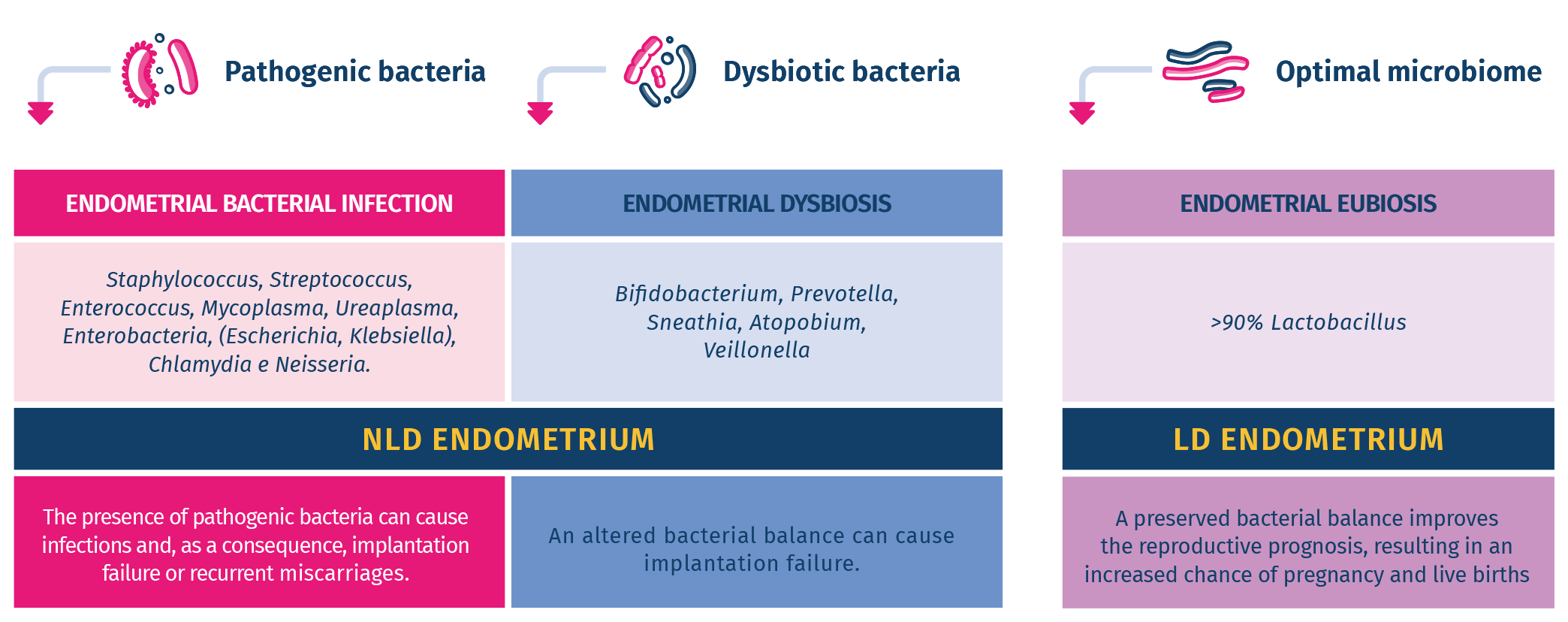
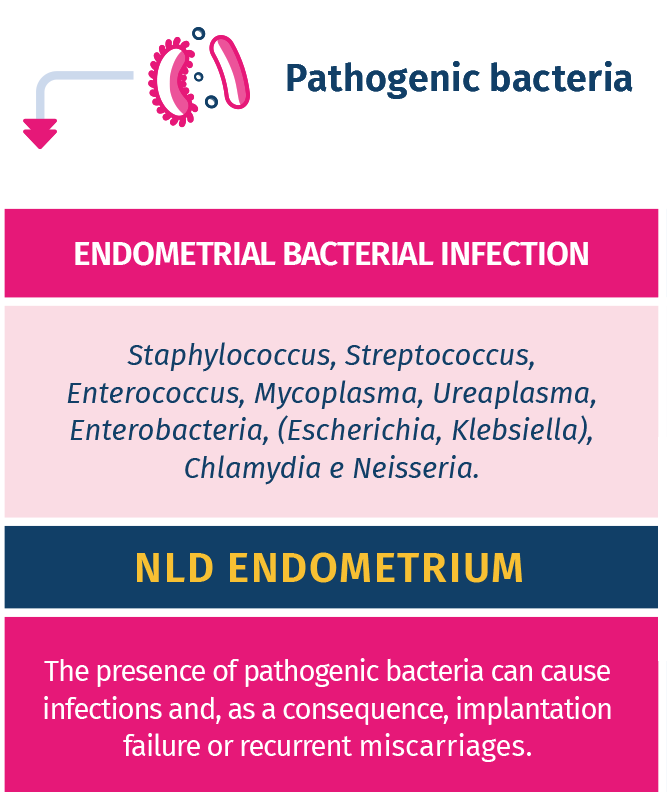
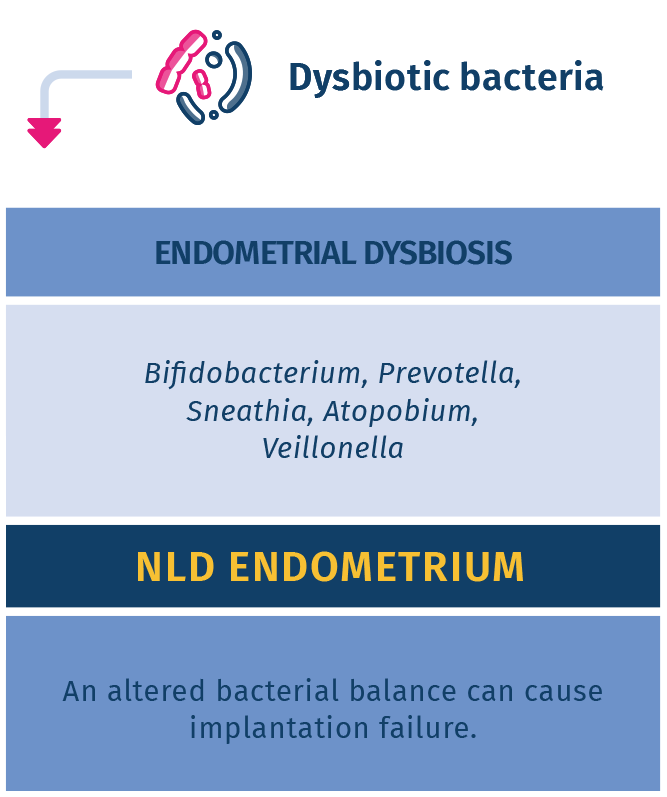
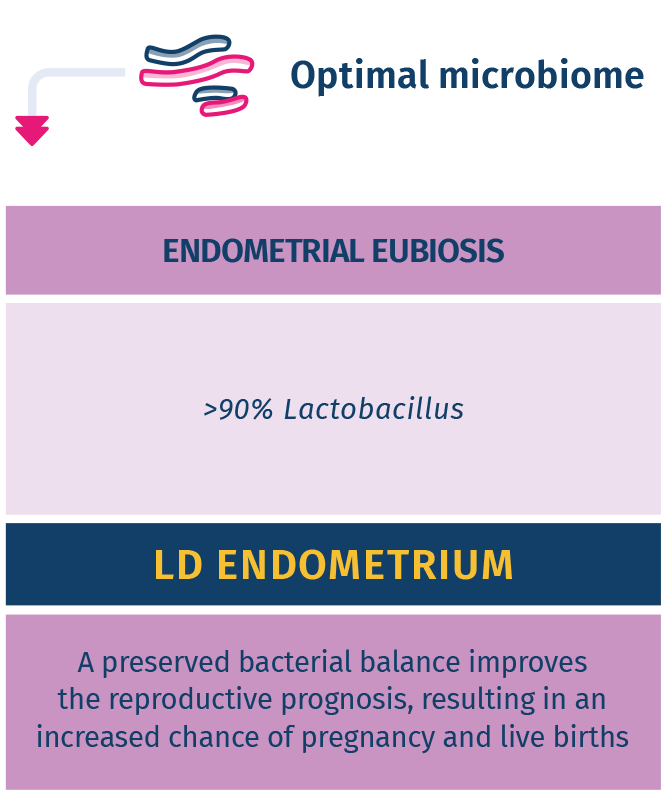
3. Moreno et al. Am J Obstet Gynecol 2016; 215:684-703. DOI: 10.1016/j.ajog.2016.09.075

Endometrial microbiome analysis can improve the chances of pregnancy in couples with a history of previous reproductive failures.
AIMS AND BENEFITS OF THE TEST

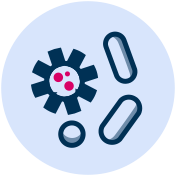
To determine whether the uterine microbial environment is optimal for embryo implantation. Depending on the results, the test may recommend embryo transfer (normal endometrial microbioma) or, in case of abnormal endometrial microbioma, to perform an antibiotic or probiotic treatment to restore the optimal microbial environment.

To improve the chances of pregnancy, in couples with a history of reproductive failure.
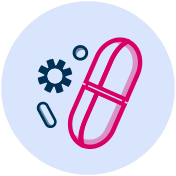
To identify bacteria causing chronic endometritis (CE). The detection of these pathogenic bacteria allows to undertake an antibiotic treatment, with the aim of improving the clinical management of patients with such silent disease.
INDICATIONS FOR TESTING


Patients with
Recurrent Implantation Failure (RIF)

Patients with
Recurrent Pregnancy Loss (RPL)
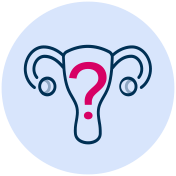
Any patient
wishing to conceive,
by assessing the microbiological
environment that the embryo will
encounter at implantation
HOW THE TEST WORKS



HOW TO ORDER A TEST



SAMPLE COLLECTION
The test can be performed from an endometrial biopsy or endometrial fluid sample. The sampling must be carried out by carefully following the instructions contained in the sampling kit. Sample collection can be performed between day 15 and day 25 of the natural cycle, or during the uterine secretory phase in a HRT cycle.
TECHNICAL REPORT


NEGATIVE
The endometrial microbiome is normal (Lactobacillus dominated endometrium, with high percentage of Lactobacilli, ≥90%).

POSITIVE
The test identified dysbiotic or pathogenic bacteria, causing a non–Lactobacillus dominated (NDL) endometrial microbiota (<90% Lactobacillus). The test detected specific bacteria causing CE (Enterococcus spp., Enterobacteriaceae, Streptococcus spp., Staphylococcus spp., Mycoplasma spp, and Ureaplasma spp) or pathogens associated with sexually transmitted infections (e.g. Chlamydia and Neisseria spp). A positive test result is strongly correlated with adverse reproductive outcomes (reduced implantation rate and increased miscarriage rate).

NEGATIVE
The endometrial microbiome is normal (Lactobacillus dominated endometrium, with high percentage of Lactobacilli, ≥90%).

POSITIVE
The test identified dysbiotic or pathogenic bacteria, causing a non–Lactobacillus dominated (NDL) endometrial microbiota (<90% Lactobacillus). The test detected specific bacteria causing CE (Enterococcus spp., Enterobacteriaceae, Streptococcus spp., Staphylococcus spp., Mycoplasma spp, and Ureaplasma spp) or pathogens associated with sexually transmitted infections (e.g. Chlamydia and Neisseria spp). A positive test result is strongly correlated with adverse reproductive outcomes (reduced implantation rate and increased miscarriage rate).
EndoBiome test report provides information on the overall microbial environment of the uterine cavity, including:
- Percentage of Lactobacilli in the endometrial sample;
- Percentage of the most represented bacteria detected in the endometrial sample;
- Whether the endometrial microbiome is normal or abnormal;
- Identification and percentages of specific bacteria causing CE (Enterococcus spp., Enterobacteriaceae (Escherichia, Klebsiella), Streptococcus spp.;
- Identification and percentages of pathogens associated withsexually transmitted infections (e.g. Chlamydia and Neisseria spp).
- Recommended probiotic/antibiotic therapy, if required.

Fast TAT:

WHY CHOOSE


ADVANCED MOLECULAR DIAGNOSTICS SOLUTIONS USING STATE-OF-THE ART TECHNOLOGIES
GENOMICA is recognized as one of the most advanced molecular diagnostics laboratory in Europe, both for the state-of-the-art instruments and technologies, as well as for its high quality standards. With a comprehensive portfolio of over 10.000 genetic tests, GENOMICA is able to satisfy increasingly specialised requests in the field of molecular genetics, providing physicians and their patients with innovative and highly specialised diagnostic solutions for any clinical need

Over 100.000
genetic tests/year

Test performed in Italy
(Rome or Milan)

20+ years experience in prenatal molecular diagnostics

Fast
TAT
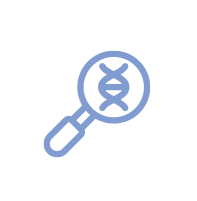
Dedicated
R&D team
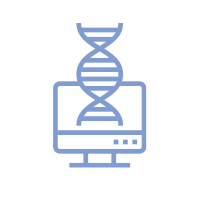
Laboratories with groundbreaking technologies and high quality standards

Personalized genetic counseling with genetic counselors experts in discussing genetic test results and familial risks

International
Partnership
WHY CHOOSE


ADVANCED MOLECULAR DIAGNOSTICS SOLUTIONS USING STATE-OF-THE ART TECHNOLOGIES
GENOMICA is recognized as one of the most advanced molecular diagnostics laboratory in Europe, both for the state-of-the-art instruments and technologies, as well as for its high quality standards. With a comprehensive portfolio of over 10.000 genetic tests, GENOMICA is able to satisfy increasingly specialised requests in the field of molecular genetics, providing physicians and their patients with innovative and highly specialised diagnostic solutions for any clinical need

Over 100.000 genetic tests/year

Test performed in Italy
(Rome or Milan)

20+ years experience
in prenatal molecular diagnostics

Fast
TAT

Dedicated
R&D team

Laboratories with groundbreaking technologies and high quality standards

Personalized genetic counseling with genetic counselors experts in discussing genetic test results and familial risks

International
Partnership
Information request for ENDOBIOME Test
Fill out this form for a free consultation.
One of our professionals will contact you, free of charge and without obligation, to provide you with all the information you need.
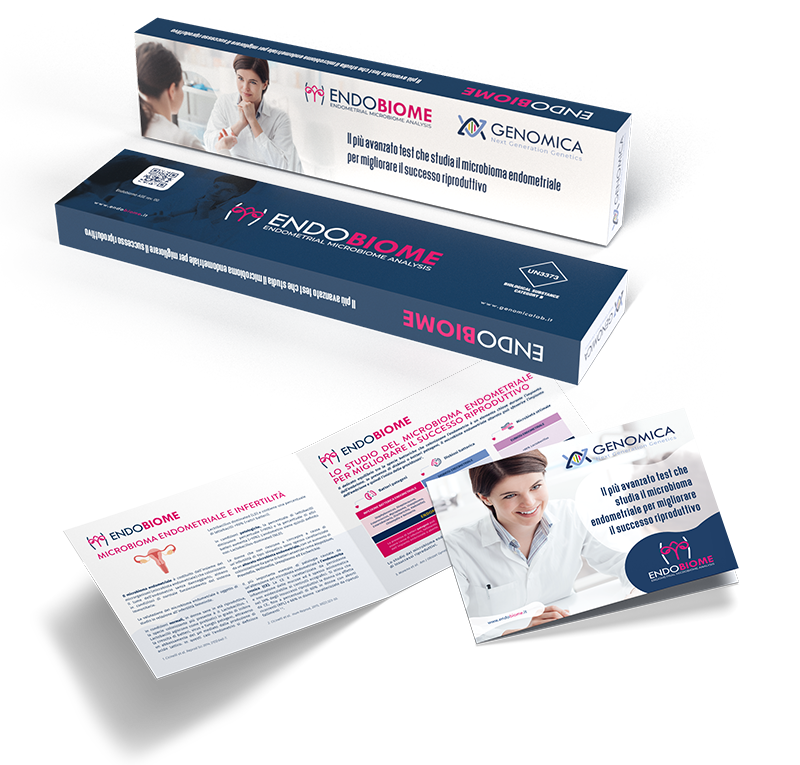


 Italiano
Italiano English
English